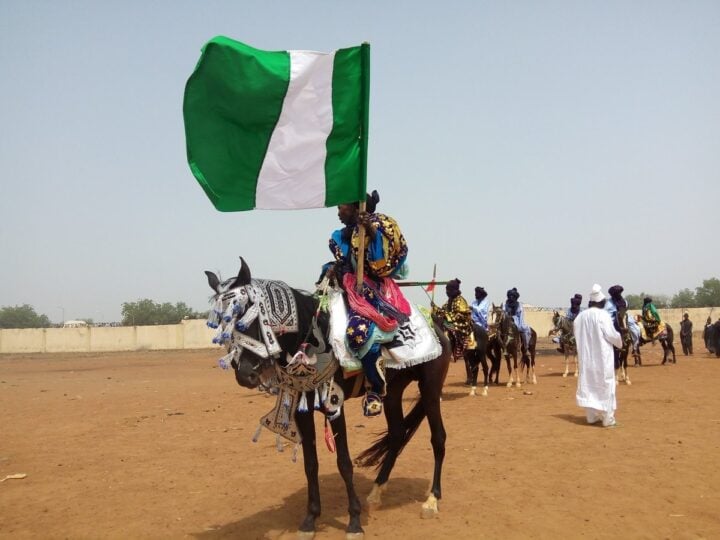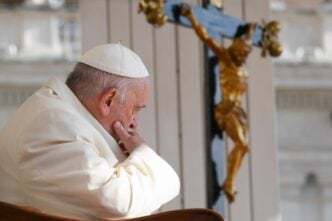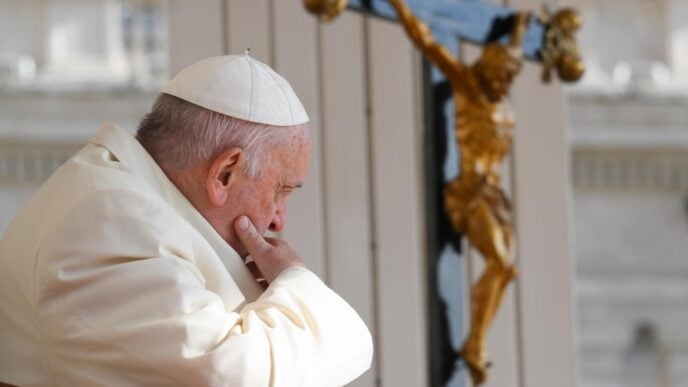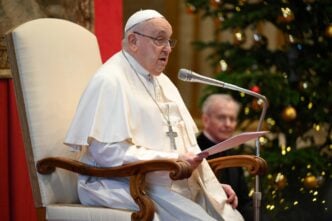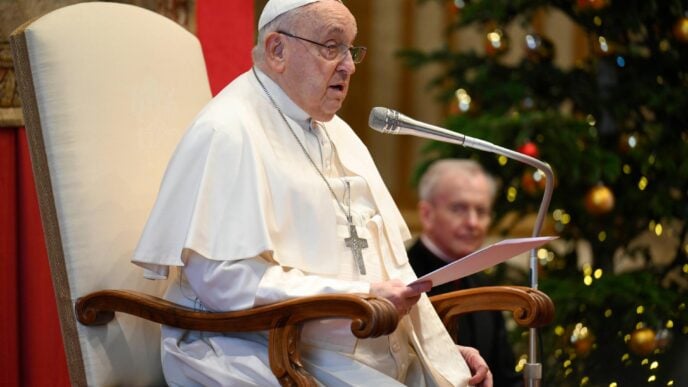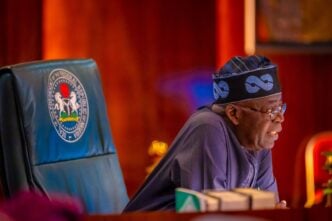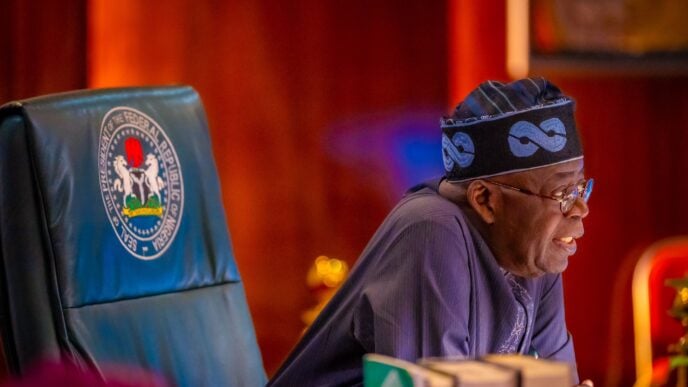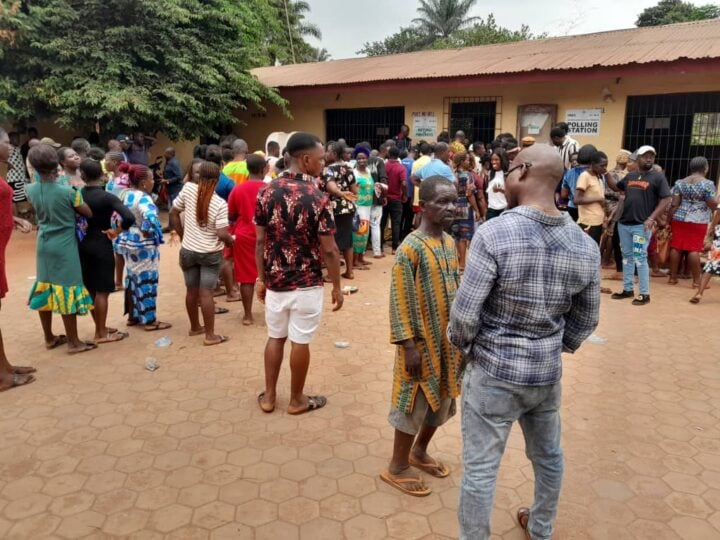A horse rider displays the Nigerian flag
Nigeria grapples with a deeply fractured identity, a nation where religious cohesion in the North contrasts sharply with the ethnic divisions that often characterise the South. The unsettling silence of some prominent Christian leaders in the face of escalating violence against Christians highlights this, and someone recently pointed out to me that the Christian clerics that I praised in the past for speaking up, John Onaiyekan, David Oyedepo, and Paul Enenche, all happen to be from the Middle Belt.
This observation put the muted response from Southern Christian clerics in a particularly jarring light especially compared to the vocal condemnations emerging from churches in the West, and from Nigeria’s own Muslim community when their own are killed. It forces us to confront an uncomfortable question: in a country constantly navigating the turbulent waters where religious and ethnic loyalties intersect, does the bond of shared Christian faith yield to the stronger pull of ethnic affiliation?
This regional divergence seems strained by the notion of a unified Nigerian identity. In the predominantly Muslim North, religion serves as a powerful unifying force. It permeates social structures, shapes political alliances, and, regrettably, frames the narratives of conflict. Groups such as Boko Haram frequently articulate their violence through a religious lens, positioning themselves as defenders of Islam, irrespective of the legitimacy or opportunism inherent in such claims. Conversely, Southern Nigeria, while largely Christian in its demographics, presents a different picture. Here, ethnic identities take precedence, with the major groups – the Yoruba, Igbo, and a multitude of smaller ethnic communities – often prioritising their ethnic heritage over a unified Christian identity. This fundamental difference between the North and South raises critical inquiries.
Firstly, why does the North seem to have a more cohesive religious identity compared to the fragmented ethnic landscape of the South? Could historical factors play a role? The legacy of the Sokoto Caliphate, for instance, arguably entrenched Islam as a significant governing ideology in the region. Alternatively, could the South’s ethnic fragmentation be a lingering consequence of unresolved colonial tribal rivalries that continued into the post-independence era? Secondly, does Christianity in Nigeria lack a compelling unifying narrative? Unlike the more centralised clerical structure often associated with Islam in the North, represented by the Sultan of Sokoto, Christianity in the South is marked by a diverse array of denominations – Catholic, Anglican, Pentecostal, among others – often operating along existing ethnic lines. This raises the uncomfortable possibility that Southern Christian leaders might hesitate to speak out against violence targeting Christians because their primary loyalty lies with their ethnic group rather than their shared faith.
Advertisement
The Middle Belt region of Nigeria serves as a poignant microcosm of this national identity crisis. Here, the fault lines of religion and ethnicity converge, often with devastating consequences. Indigenous ethnic groups, many of whom adhere to Christianity or traditional animist beliefs, frequently find themselves in violent conflict with predominantly Muslim Fulani herders over increasingly scarce land, resources, and political representation.
While the rhetoric surrounding these clashes often adopts a religious tone, the underlying tensions frequently stem from long-standing ethnic grievances and competition. Reports from respected news outlets consistently document systematic attacks against Christians in this volatile region. Yet, the broader Christian community’s response often appears disjointed and lacks a unified voice.
This reality prompts further critical questions. Is the apparent silence of some Christian leaders in the face of such violence a calculated survival strategy in regions where state protection for minorities is inadequate? Do Christian clerics choose to remain silent out of fear of potential reprisals? Or does their inaction stem from deeper ethnic divisions, where, for example, an Igbo priest might feel a diminished sense of urgency or responsibility to advocate for a Berom victim from Plateau State? Furthermore, how might Nigeria’s political elite potentially exploit these existing divisions? It is plausible that politicians in the North strategically leverage religious solidarity to mobilise their voter base, while their counterparts in the South appeal to sentiments of ethnic nationalism. Could this political calculus explain why even Christian politicians often fail to frame violence against Christians as a national crisis demanding a unified response?
Advertisement
The path forward for Nigeria hinges on its ability to cultivate a national identity that transcends the divisive forces of religion and ethnicity. This necessitates a multi-pronged approach. Firstly, genuine and sustained interfaith dialogue is crucial. Initiatives that bring together Muslim and Christian leaders must move beyond theological discussions to address shared socio-economic grievances and instances of state neglect that can fuel tensions. Secondly, the establishment of a robust system of justice and accountability is paramount. The government must demonstrate an unwavering commitment to prosecuting perpetrators of violence, whether they belong to Fulani militias, Boko Haram, or ethnic-based militant groups, without any hint of bias. Finally, fostering ethnic inclusivity in national narratives is essential. The diverse tapestry of Nigeria’s ethnic groups should be celebrated as a strength, rather than allowing it to be manipulated as a tool for division.
Ultimately, the fundamental question remains: can Nigeria truly exist as one unified nation? The country’s aspirational motto, “Unity in Diversity,” increasingly rings with irony in the face of these deep-seated divisions. If the North continues to define itself primarily through a religious lens, and the South through the prism of ethnicity, the very concept of a cohesive Nigerian identity hangs precariously in the balance. Until these fundamental questions are directly confronted and addressed with genuine commitment, the silence of some Christian leaders – and the cycle of violence it arguably enables – will sadly remain a potent symptom of a much deeper and more pervasive national malaise.
Nwanze is a partner at SBM Intelligence
Advertisement
Views expressed by contributors are strictly personal and not of TheCable.

